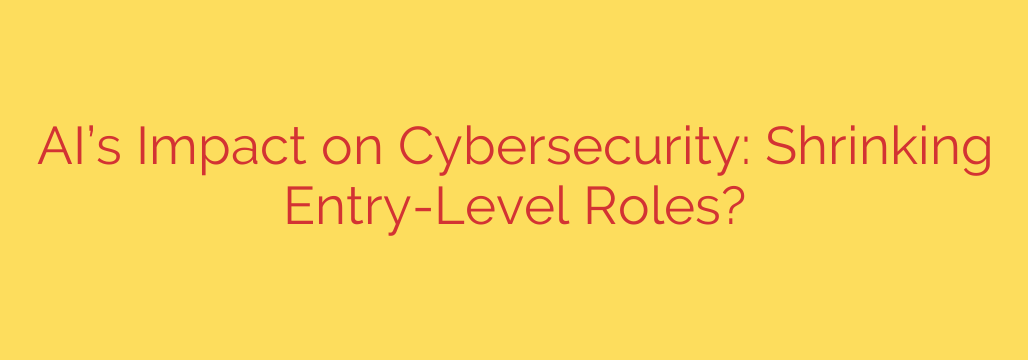
The Future of Cybersecurity Careers: How AI is Reshaping Entry-Level Roles
The headlines are everywhere: Artificial Intelligence is poised to revolutionize every industry, and cybersecurity is no exception. For those aspiring to launch a career in this critical field, a pressing question arises: Is AI making it harder to find an entry-level job?
The short answer is no, but the nature of the work is undergoing a profound transformation. While the demand for skilled cybersecurity professionals remains at an all-time high, the skills required to get your foot in the door are evolving rapidly. AI isn’t eliminating the need for human experts; it’s changing what it means to be an expert.
The Traditional Path: A Look at the Past
For years, the gateway into a cybersecurity career was often a role as a Tier 1 analyst in a Security Operations Center (SOC). This position was the boot camp of the industry. Newcomers would spend their days sifting through thousands of alerts from firewalls, intrusion detection systems, and other security tools.
The job involved:
- Manually reviewing logs.
- Identifying false positives.
- Escalating potentially legitimate threats to senior analysts.
This repetitive, data-intensive work was crucial for learning the fundamentals of threat detection and network behavior. However, it’s precisely these types of tasks that AI and machine learning excel at.
How AI is Automating the Entry-Level Playbook
Modern security platforms, such as advanced Security Information and Event Management (SIEM) and Security Orchestration, Automation, and Response (SOAR) systems, are now powered by sophisticated AI. These tools can analyze immense volumes of data in real-time, automatically filter out the noise, and even initiate basic response actions far faster and more accurately than a human team.
This automation means that many of the traditional duties of a junior analyst are now being handled by algorithms. The result is not a reduction in jobs, but a redefinition of the entry-level role. Companies no longer need a large team to simply watch a dashboard. Instead, they need professionals who can manage, fine-tune, and interpret the output of these intelligent systems.
The New Skillset: What Aspiring Professionals Need Today
The barrier to entry in cybersecurity isn’t necessarily gone—it has simply shifted. Today’s successful entry-level candidate needs to move beyond basic monitoring and embrace a more analytical and strategic mindset. The focus is less on sifting through alerts and more on understanding the context behind them.
Here are the key skills that are becoming essential for a future-proof cybersecurity career:
- AI and Machine Learning Literacy: You don’t need to be a data scientist, but you must understand how security AI models work. Knowing their strengths and weaknesses is crucial for identifying when a tool might be missing a sophisticated threat or generating a misleading result.
- Data Analysis and Interpretation: The ability to look at the output from an AI tool and derive meaningful insights is paramount. This involves understanding data patterns and asking the right questions to uncover the story behind the data.
- Strategic Threat Hunting: Instead of waiting for an alert, modern analysts are expected to proactively hunt for threats that may have evaded automated defenses. This requires curiosity, critical thinking, and a deep understanding of attacker techniques.
- Prompt Engineering for Security: As AI becomes more interactive, knowing how to craft precise queries (prompts) to investigate incidents or analyze security posture will be a highly valued skill.
Essentially, AI is handling the “what,” freeing up human analysts to focus on the “why” and “how.” This allows junior professionals to engage in more meaningful, high-impact work earlier in their careers, such as incident response, threat intelligence, and digital forensics.
Actionable Steps for Breaking into the Field
If you’re aiming for a career in cybersecurity, it’s vital to adapt your learning and development strategy.
- Embrace Continuous Learning: The field is evolving faster than ever. Stay current with the latest AI-driven security tools and methodologies through blogs, webinars, and online courses.
- Develop Critical Thinking Skills: Focus on developing your problem-solving abilities. AI can present data, but it relies on human intellect to connect disparate dots, understand attacker motivation, and formulate a comprehensive response strategy.
- Get Hands-On with New Tools: Many vendors offer free trials or community editions of their AI-powered platforms. Setting up a home lab to experiment with these tools will give you invaluable practical experience that stands out on a resume.
- Focus on the Fundamentals: While tools change, the core principles of networking, operating systems, and security architecture remain essential. A strong foundation makes it easier to understand and leverage any new technology, including AI.
The rise of AI in cybersecurity is not a threat to job seekers but an opportunity. It is automating the mundane and elevating the role of the human analyst. By focusing on developing analytical, strategic, and technical skills, aspiring professionals can position themselves not just for their first job, but for a successful and rewarding long-term career in a field that is more important than ever.
Source: https://www.helpnetsecurity.com/2025/07/22/ai-in-cybersecurity-entry-level-jobs/








